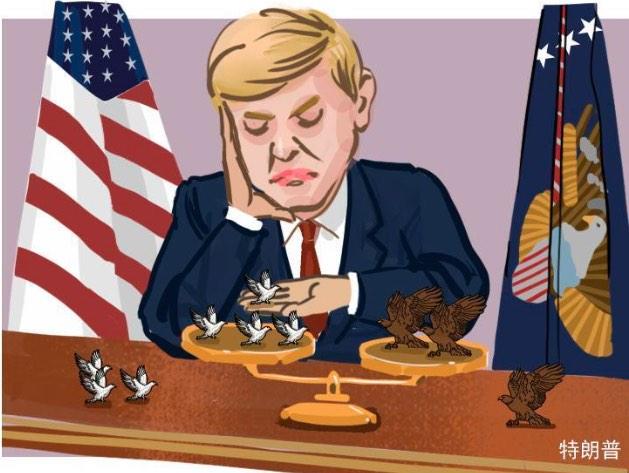The Gaza ceasefire has broken down, the Russia-Ukraine deadlock continues, and geopolitical risks may continue to push up oil prices.
2025-08-01 15:33:59

Trump's negotiating style: relying on personal relationships and economic pressure
Trump's second term has only just begun, but former officials and experts outside the administration say the president's negotiating style has already settled into a pattern. This pattern relies heavily on Trump's personal relationships with world leaders and his recourse to threats, economic pressure, and even the use of force when frustrated. It also reflects his impatience with the lengthy negotiations required to resolve the world's most intense conflicts, focusing instead on "working" for ceasefires.
“There’s a difference between brokering a ceasefire and a truce and ending a war,” said Dennis Ross, a senior official who has worked on Middle East peace issues in both Republican and Democratic administrations. “The former is about stopping the fighting, while the latter is about addressing the root causes of the conflict and reaching an agreement to resolve the differences, or at least get both sides to adjust their thinking and reach a temporary model of coexistence.”
Comparison with predecessor Biden
Trump's predecessor, Joe Biden, also drew criticism for his handling of Russia and Israel. Former President Biden helped build a coalition to arm and defend Ukraine, but he never engaged with Putin and failed to convince Moscow to halt its intensifying offensive. On the Middle East, there was division within the Democratic Party over Biden's support for Israel, which allowed him to maintain some aid to Gaza but failed to secure the release of all hostages held by Hamas or a lasting ceasefire.
Partial diplomatic achievements: Temporary easing of regional conflicts
Mr. Trump has had some successes. He used economic pressure to quell a border conflict between Cambodia and Thailand, and aides say he engaged in intensive telephone diplomacy to avoid an escalation of war between two nuclear powers, India and Pakistan.
"We've brokered a lot of ceasefires. If it weren't for me, there would be six major wars going on right now. India would be fighting Pakistan," Trump said during a visit to Scotland this week.
Ukraine: Pressure and uncertainty coexist
Trump repeatedly promised during his campaign to quickly end the war in Ukraine, which began with Russia's seizure of Crimea and attacks in eastern Ukraine in 2014 and escalated into a full-scale invasion three years ago.
In recent days, Trump warned Russian President Vladimir Putin that the fighting must end by August 8, otherwise the United States will impose high new tariffs and sanctions on Russia's major trading partners as economic punishment.
Trump said Thursday (July 31) that he would send special envoy Steve Witkoff to Russia after his visit to Israel. "I think what they're doing is disgusting," Trump said of Russia's recent missile and drone attacks on Ukraine, which have been intensified by Putin in recent weeks. "I don't know if it's going to work, but we're going to do it," he said of the economic measures aimed at hitting the Russian economy.
This week, Trump threatened to impose steep tariffs on countries that trade with Russia, such as India, in an attempt to change Putin's calculations. He also agreed to sell Patriot anti-missile systems and other weapons systems to European countries, allowing them to assist Kyiv from their own stockpiles. But Trump has also at times signaled a desire to walk away from the conflict, leaving even his staunchest allies unsure of just how tough a stance the White House is prepared to take against Russia.
Gaza issue: Ceasefire efforts stalled, strategy missing
Israeli Prime Minister Benjamin Netanyahu met with visiting US Middle East envoy Witkoff on July 31st. Israeli media subsequently reported that Israel believed ceasefire talks in the Gaza Strip were on the verge of collapse and was considering expanding military operations to demilitarize the Strip. Netanyahu and Witkoff spoke for nearly three hours. A senior Israeli official told Hebrew media outlets, including Israel Today and the New News website, that, given the stance of the Palestinian Islamic Resistance Movement (Hamas) and the impending failure of ceasefire talks, Israel and the US had agreed to move away from seeking a short-term ceasefire and partial release of detainees and instead pursue a comprehensive solution involving the disarmament of Hamas, the demilitarization of the Gaza Strip, and the release of all detainees. The official also stated that Hamas had "cut off communication."
Six months into his presidency, Trump's repeated efforts to broker a ceasefire in Gaza have stalled. Witkoff, who also serves as special Middle East envoy, plans to visit Gaza on Friday (August 1st) after concluding meetings in Israel to address the dire humanitarian crisis. Earlier this week, Trump said the crisis has led to "real hunger." A UN-backed organization claims the Gaza Strip is experiencing famine, a claim denied by Israeli officials.
On the Gaza issue, a major question is whether the White House has a broader strategy to achieve and secure lasting peace. Witkoff assisted the Biden administration in negotiating an agreement during the presidential transition that would have resulted in the release of nearly 40 hostages from Hamas and blamed the militant group for the subsequent standoff. However, Trump's idea of relocating Gazans to other countries remains unworkable for Arab countries and the Strip's two million residents. The White House also lacks a detailed implementation plan for how Gaza would be governed if peace were achieved, or which Arab or international force would provide security if Hamas were driven out.
Diplomatic moves in other regions
This is just one of the diplomatic problems Trump faces in the Middle East. During his campaign, he said he could reach a historic agreement to curb Iran's nuclear program. But after two months of diplomatic maneuvering, he instead resorted to airstrikes and joined Israel in a military operation aimed at thwarting Tehran's nuclear program. While the White House says it remains ready for direct talks with Iran, Tehran insists it will never agree to Trump's core demand: that Iran give up enriched uranium, which it would need to build a nuclear bomb.
Elsewhere, the Trump administration brokered a peace agreement between Rwanda and the Democratic Republic of Congo, aiming to end years of fighting in eastern Congo. It also pushed hard to end Sudan's ongoing civil war, a conflict that has triggered widespread ethnic cleansing and fueled one of the world's worst humanitarian crises. Diplomatic efforts to end those wars have ultimately fizzled under the Biden administration.
India-Pakistan ceasefire: Considered a significant achievement, but its foundations are unstable
Trump's allies say his efforts to broker a ceasefire between India and Pakistan in May may be his most notable diplomatic achievement, a move that prevented an escalating conflict between the two nuclear-armed powers.
“Whenever two nuclear-armed nations start shooting at each other, it’s absolutely a matter for the United States,” said Lisa Curtis, a former senior National Security Council official who oversaw U.S. relations with South and Central Asia during Trump’s first term. “It’s the right thing for the United States to get involved.” However, the situation between India and Pakistan remains volatile, and the fundamental tensions that led to the fighting persist: India’s control over the disputed Kashmir region and India’s accusations that Pakistan supports terrorists.
A classic case of tariff pressure: the conflict between Thailand and Cambodia
Perhaps the clearest example of how Trump wields tariffs in peace talks was the conflict between Thailand and Cambodia in July. Trump aides said the president threatened to halt negotiations aimed at averting significant tariff increases on both countries if they did not stop fighting. With the ceasefire holding, U.S. Commerce Secretary Howard Lutnick said on Thursday that the United States had reached trade agreements with Thailand and Cambodia, but provided no details.
Impact on crude oil prices:
The Middle East situation, Gaza and Iran issues: The breakdown of ceasefire negotiations in Gaza and Israel's consideration of expanding military action could escalate tensions in the region. As a major oil-producing region, instability in the Middle East could easily trigger market concerns about oil supply disruptions, pushing up oil prices. Furthermore, if the United States escalates its tough stance on Iran's nuclear program (such as airstrikes), it could affect Iranian oil exports and further disrupt the global crude oil supply balance.
Uncertainty of the Russia-Ukraine conflict: Trump's attitude towards the Ukrainian conflict is wavering (sometimes putting pressure on Russia, sometimes showing the idea of letting it go). If the conflict becomes protracted or escalates, it may affect Russia's oil exports (such as increased sanctions), which will support oil prices. At the same time, Europe's demand for energy independence may boost demand for crude oil substitutes, which will suppress oil prices. At the same time, if the situation eases, the relaxation of energy trade restrictions will also suppress oil prices.
Economic interactions between the United States and its allies: Trump's frequent use of tariffs to exert pressure (such as threatening to impose tariffs on its Russian trading partner) may indirectly affect the efficiency of global trade circulation and increase oil transportation and transaction costs. In addition, if the energy cooperation between the United States and Pakistan (joint development of oil reserves) is implemented, it may have a long-term impact on the regional crude oil supply structure and suppress oil prices.
Overall
In the current geopolitical landscape, oil prices are more likely to be driven in the short term by the "risk premium" of the Middle East and Russia-Ukraine conflicts. The potential for military escalation triggered by the breakdown of ceasefire talks in Gaza, the US's tough stance on Iran's nuclear program, and the uncertainty surrounding the Russia-Ukraine conflict could all heighten market concerns about crude oil supply disruptions, driving oil prices higher and fluctuating. If the Trump administration's intervention in the conflict continues to be characterized by short-term pressure and a lack of a long-term strategy, the recurring geopolitical risks could keep oil prices highly volatile, making it difficult to establish a clear downward trend. Given the current geopolitical dynamics, oil prices are likely to be significantly impacted in the short term by the risk premiums of the Middle East (Gaza, Iran) and the Russia-Ukraine conflict, making them more likely to fluctuate upward. Furthermore, the short-term nature and uncertainty of the Trump administration's foreign policy will exacerbate oil price volatility.
At 15:32 Beijing time, U.S. crude oil is currently trading at $69.25 per barrel.
- Risk Warning and Disclaimer
- The market involves risk, and trading may not be suitable for all investors. This article is for reference only and does not constitute personal investment advice, nor does it take into account certain users’ specific investment objectives, financial situation, or other needs. Any investment decisions made based on this information are at your own risk.





















